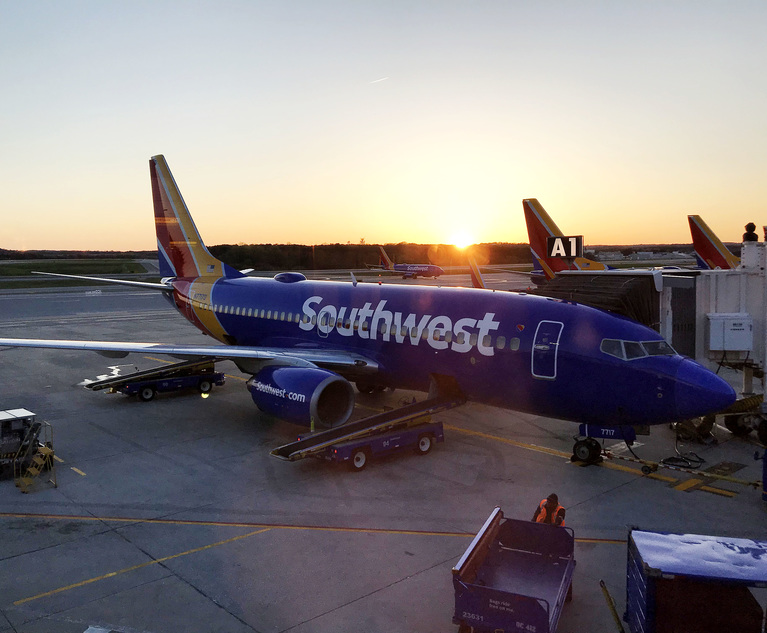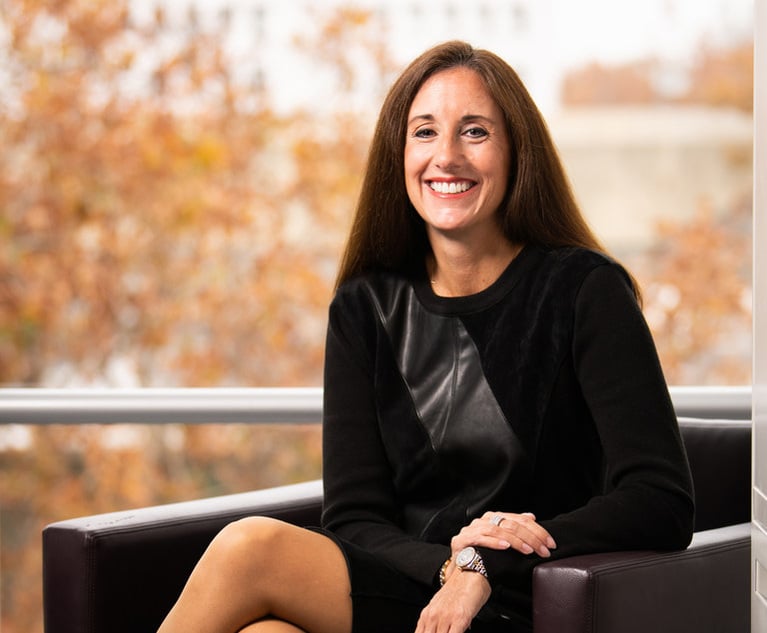Is Southwest Airlines Actually Broken?
On Tuesday, U.S. Secretary of Transportation Pete Buttigieg appeared on the PBS Newshour, where he vowed to hold Southwest accountable for what has been…
December 28, 2022 at 10:20 AM
6 minute read
Commentary Credit: Diego M. Radzinschi/ALM.
Credit: Diego M. Radzinschi/ALM.
On Tuesday, U.S. Secretary of Transportation Pete Buttigieg appeared on the PBS Newshour, where he vowed to hold Southwest accountable for what has been a highly disruptive string of flight delays and cancellations over the peak Christmas travel period.
Southwest's meltdown has been historically bad and continued past Christmas into this week. 2,507 more flights were canceled for Wednesday, and close to 2,400 have been canceled for Thursday.
Buttigieg commented on PBS, "It's a meltdown for sure – this is an unacceptable situation. Most of the other airlines are in the low single digits for flight cancellation rates. Southwest is at 70%."
In a video statement, Southwest CEO Bob Jordan vowed that this wouldn't happen again "Please also hear that I'm truly sorry. Southwest has the largest schedule in the country because we have built our schedule around communities and not hubs."
This is the real issue here, and no amount of apologies or government threats is going to change it because the issue is a structural one. Southwest has become such a successful airline by staying away from the hub system, opting instead for flying to more cities without banks of planes and crew based in hubs.
The other major airlines operate on a hub system. Major airline hubs such as Delta's Atlanta, United's Newark, and American's Dallas-Fort Worth are among the busiest home bases of the airlines, where flights are routed to and from. When there is a catastrophic weather issue, as we've seen over the Christmas travel season, it is easier to keep or return planes and crews to the hubs. With a flight schedule that involves more communities than hub cities, such as that used by Southwest, it can take a fair amount of time to get things running normally after a significant interruption – and that's what we're seeing now.
Of course, airlines are private companies and want the government to stay out of their business. That is, until they reach out to the government for subsidies and other types of help. Then the government takes public money and bails out the airline.
Case in point, Southwest posted a $116 million profit in 2021 following a massive $25 billion pandemic-related airline industry bailout earlier that year.
Once passengers, the government, and the media are out of the intensity of the moment and less exorcised about these thousands of canceled flights, we all need to consider whether trying to force Southwest to change its business model actually makes sense.
The ultimate solution here is legislation that does what rules in other jurisdictions do – protect the passenger.
A close read of the U.S. airline passenger rules is an exercise in frustration. It's full of "possibly," and "maybe," even when it comes to such basic questions as whether you can get placed on a different flight after an extensive delay.
West Palm Beach lawyer, Adriana Gonzalez, points out that "In the European Union, for example, there is legislation that compensates passengers for interruptions to each flight segment Yet, here in the U.S., airlines are not required to compensate passengers when flights are delayed or canceled."
In the EU, it's automatic. Having lived in Europe and been a frequent flier, on many occasions, I received compensation for a delayed or canceled flight automatically, on the same day. The airlines are well aware of their legal obligations, just as passengers are acutely aware of their rights. It really is a smooth process. I have even purchased tickets and, for whatever reason, chosen not to take the flight – and still record a same-day refund for a canceled or badly delayed light.
Does the U.S. flying population really benefit from forcing Southwest to adopt a hub model, following the lead of the other major airlines? Because, as someone who has own over three million miles and understands how airlines work, that's the only surefire way to ensure that Southwest doesn't have a similar system failure in the future. Airlines that operate out of hubs are simply far, far easier to reset than an airline that keeps planes and crews all over the country. But the hub system comes with a serious downside that begins with the fact that where an airline has control of a hub, it's easier for them to set high prices for specific routes.
This excellent YouTube series by a pilot is a great explainer. He is a "Newark-based" pilot but actually lives in Minneapolis. His videos shed light on how the hub system works in practical terms.
So while individual passengers aren't going to be compensated for their canceled flights over Christmas, Southwest might be facing enough of a public groundswell this week to make them nervous. But there's probably no quick solution here. By framing Southwest's business model as a commitment to American communities, Southwest's CEO has proven one thing definitively – that Southwest has an excellent crisis management team.
It's going to be interesting to see what the federal government does once the post-weather social media storm dies down. Unless Congress is willing to take on the airlines and legislate a passenger bill of rights that has both serious bark and bite, it seems unlikely that Southwest is going to be motivated to make foundational modifications to its business model to satisfy the government and passengers that what's happening right now won't happen again.
About Aron Solomon:
A Pulitzer Prize-nominated writer, Aron Solomon, JD, is the Chief Legal Analyst for Esquire Digital and 24-7 Abogados. He has taught entrepreneurship at McGill University and the University of Pennsylvania, and was elected to Fastcase 50, recognizing the top 50 legal innovators in the world. Aron has been featured in Forbes, CBS News, CNBC, USA Today, ESPN, TechCrunch, The Hill, BuzzFeed, Fortune, Venture Beat, The Independent, Fortune China, Yahoo!, ABA Journal, Law.com, The Boston Globe, NewsBreak, and many other leading publications.
This content has been archived. It is available through our partners, LexisNexis® and Bloomberg Law.
To view this content, please continue to their sites.
Not a Lexis Subscriber?
Subscribe Now
Not a Bloomberg Law Subscriber?
Subscribe Now
NOT FOR REPRINT
© 2025 ALM Global, LLC, All Rights Reserved. Request academic re-use from www.copyright.com. All other uses, submit a request to [email protected]. For more information visit Asset & Logo Licensing.
You Might Like
View All
EB-5 Rebounds After a Rocky Year: Challenges of 2024 Lay Groundwork for a Booming 2025

Leveraging the Power of Local Chambers of Commerce: A Second-Career Lawyer’s Guide to Building a Thriving Practice
5 minute read
CFPB Proposes Rule to Regulate Data Brokers Selling Sensitive Information
5 minute read
Shifting Battlegrounds in Administrative Law, From Biden to Trump II
Law Firms Mentioned
Trending Stories
- 1Reviewing Judge Merchan's Unconditional Discharge
- 2With New Civil Jury Selection Rule, Litigants Should Carefully Weigh Waiver Risks
- 3Young Lawyers Become Old(er) Lawyers
- 4Caught In the In Between: A Legal Roadmap for the Sandwich Generation
- 5Top 10 Developments, Lessons, and Reminders of 2024
Who Got The Work
J. Brugh Lower of Gibbons has entered an appearance for industrial equipment supplier Devco Corporation in a pending trademark infringement lawsuit. The suit, accusing the defendant of selling knock-off Graco products, was filed Dec. 18 in New Jersey District Court by Rivkin Radler on behalf of Graco Inc. and Graco Minnesota. The case, assigned to U.S. District Judge Zahid N. Quraishi, is 3:24-cv-11294, Graco Inc. et al v. Devco Corporation.
Who Got The Work
Rebecca Maller-Stein and Kent A. Yalowitz of Arnold & Porter Kaye Scholer have entered their appearances for Hanaco Venture Capital and its executives, Lior Prosor and David Frankel, in a pending securities lawsuit. The action, filed on Dec. 24 in New York Southern District Court by Zell, Aron & Co. on behalf of Goldeneye Advisors, accuses the defendants of negligently and fraudulently managing the plaintiff's $1 million investment. The case, assigned to U.S. District Judge Vernon S. Broderick, is 1:24-cv-09918, Goldeneye Advisors, LLC v. Hanaco Venture Capital, Ltd. et al.
Who Got The Work
Attorneys from A&O Shearman has stepped in as defense counsel for Toronto-Dominion Bank and other defendants in a pending securities class action. The suit, filed Dec. 11 in New York Southern District Court by Bleichmar Fonti & Auld, accuses the defendants of concealing the bank's 'pervasive' deficiencies in regards to its compliance with the Bank Secrecy Act and the quality of its anti-money laundering controls. The case, assigned to U.S. District Judge Arun Subramanian, is 1:24-cv-09445, Gonzalez v. The Toronto-Dominion Bank et al.
Who Got The Work
Crown Castle International, a Pennsylvania company providing shared communications infrastructure, has turned to Luke D. Wolf of Gordon Rees Scully Mansukhani to fend off a pending breach-of-contract lawsuit. The court action, filed Nov. 25 in Michigan Eastern District Court by Hooper Hathaway PC on behalf of The Town Residences LLC, accuses Crown Castle of failing to transfer approximately $30,000 in utility payments from T-Mobile in breach of a roof-top lease and assignment agreement. The case, assigned to U.S. District Judge Susan K. Declercq, is 2:24-cv-13131, The Town Residences LLC v. T-Mobile US, Inc. et al.
Who Got The Work
Wilfred P. Coronato and Daniel M. Schwartz of McCarter & English have stepped in as defense counsel to Electrolux Home Products Inc. in a pending product liability lawsuit. The court action, filed Nov. 26 in New York Eastern District Court by Poulos Lopiccolo PC and Nagel Rice LLP on behalf of David Stern, alleges that the defendant's refrigerators’ drawers and shelving repeatedly break and fall apart within months after purchase. The case, assigned to U.S. District Judge Joan M. Azrack, is 2:24-cv-08204, Stern v. Electrolux Home Products, Inc.
Featured Firms
Law Offices of Gary Martin Hays & Associates, P.C.
(470) 294-1674
Law Offices of Mark E. Salomone
(857) 444-6468
Smith & Hassler
(713) 739-1250






